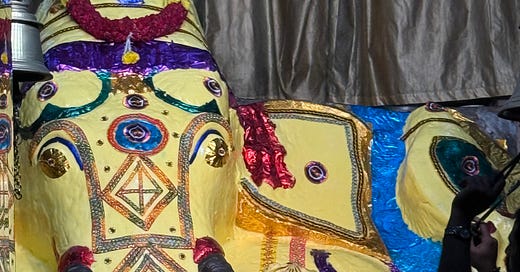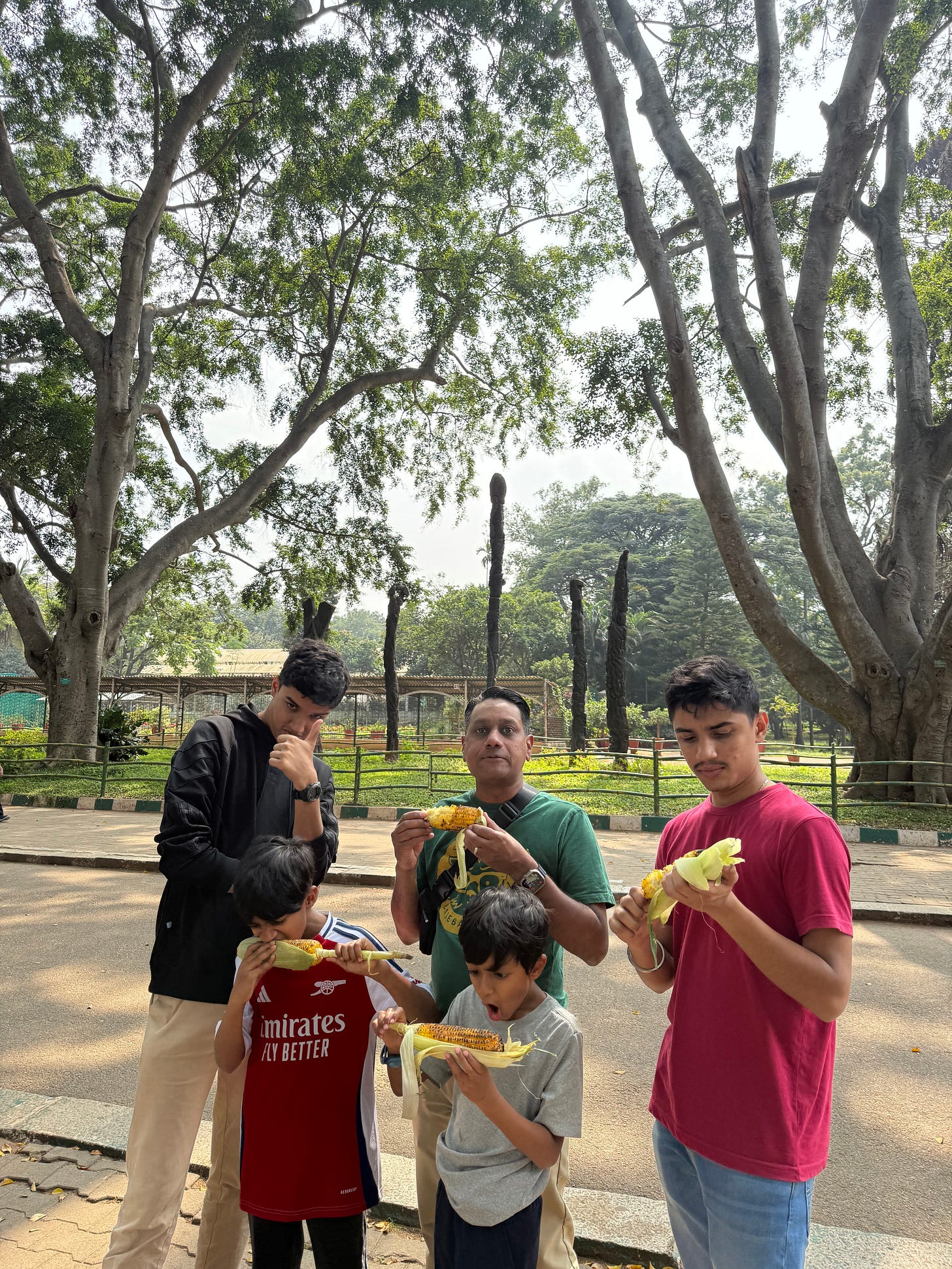How to lose your zen in 10 days…and get it back
Almost as soon as I land in Dallas on January 4th, I find out my parents are sick. I envisioned a reunion with my parents involving giving them gifts from family, showing my mother what outfits I bought in India. Instead, Venka and I deliver food to my parents, and I work on setting up doctors appointments, trying different medications, and administering manual chest physiotherapy. I work on securing a nebulizer machine for my mother, and trying to convince her to take a small dose of prednisone to help her asthma. I take off work early to drive back to East Dallas, pick up my father, and drive back to UT Southwestern so can see his geriatrician, who graciously offered a sick appointment for him. I’m a pediatrician, and when my parents are sick, I’m out of my element. I know too much to be frightened, but know too little to make me feel competent. Elderly sick parents brings out the worst in me: I’m impatient - I want them better, and I want them better NOW. The post-vacation chillax is gone.
When Venka comes home one evening after delivering hot, fresh rasam that he made, he give me a report. “Your parents are really sick. Your dad was passed out on the couch like a frat boy,” he says with a snicker. It’s his way of offering concern. He suggests having them stay with us so we can help them better.
The impending Dallas snowstorm brings out the stubborn within me.
“You’re staying with us during the storm, and that’s final,” I say to my stubborn engineering father. I brace myself for my father rocket scientist’s retort, but there is none, luckily.
They move in with us for 4 days. Luckily, I’m not on service and can “work from home,” which means that I listen to my kids screaming, fighting, laughing, while navigating telemedicine visits with parents/ families broadcasting from bedrooms filled with screaming children. But it also means that I wake up in the mornings and make spicy ginger, cardamom tea, a little toast for my parents. For lunch, Venka makes amazing rasam with fresh masala from roasted spices, inspired no doubt by my aunt’s cooking in Delhi.
My mother is too exhausted to do much of anything. The sounds of wheezing are too much to bear. The shortness of breath. The profound fatigue. The symptoms are literally my field. Her illness is what I do everyday. The sounds of my chosen profession are in my face, and it’s hard to bear.
I hook up the nebulizer, pour in the albuterol solution. I fumble with the parts - respiratory therapists usually do this part, not me. My mother doesn’t want to try the nebulizer. She has never used one, only the inhaler. But it helps her feel better, and she becomes a believer. I feel a little validated. Maybe my father delaying his retirement for the sake of my medical school was, dare I say, worth it?
I do more chest physiotherapy. I cup my hands, and beat their backs. It’s a workout, and my Apple Watch asks me if I’m working out. I click “yes.” Why not? I register a 20 minute workout. It’s actually been a several day workout, mentally and physically, but “caring for sick elderly parents” is not a workout that Apple offers to choose from.
But, there are some moments, especially when we share meals. I tell my parents of all the places we visited in Bangalore, places that remind me of the summers I spent there. Like Lalbagh gardens.
“I used to go there so much when I was young,” my mother says. She was a Botany major in Maharani College in Bangalore. “I knew all the rare species of plants, and exactly where they are located. I had two graduations at the Glass House in Lalbagh. One for my B.S., and another for my B.Ed (like a post-graduate education degree).”
“Do they charge for admission?” asks my father. Yes, I say.
“Back then, it was free,” he states with nostalgia. This was, of course 50+ years ago. My parents are telling me stories I’ve never heard. They’re small, but revealing of their worlds before I existed.
My father tells me of how he biked 12 miles to and from his college every day. My mother walked 1 hour to get to her college, and many times she did this because she didn’t have money for the bus fare. I think to the current traffic congestion, how everyone seems to own a car in Bangalore, how bicycles are non-existent in modern day Bangalore. I try and picture my parents, slim, able-bodied, physically fit, with no dyspnea on exertion. And definitely no wheezing. My mother, with her long, thick black braid swaying down her back, a hasty gait, with her sari shuffling with every step. She had no idea at that time, could not fathom, that one day, she would be driving a car in major cities in the United States.
I tell my father of our visit to the Dodduganapathi temple that houses a deity of Lord Ganesha, probably the most famous temple in all of Bangalore.
“We knew the priest there,” my father says. “They would let us go right in front of the deity,” he says. I’m astonished. I had never heard this before. It’s kind of like getting free admission to the Smithsonian.
I tell my parents that my cousin Deepak who is 20 years old and in college, could be partying in Bangalore every night, but instead makes it a priority to visit a temple every day.
“I was like that, too,” says my mother. I find out that my mother’s favorite temple was an Ganesha temple in Maleshwaram (neighborhood of Bangalore), and another Krishna temple near a railway station. She describes the location of these in great detail, and I don’t even know why this surprises me, considering Bangalore is her childhood home. But, it’s because I never knew my parents before they came to America. I can only construct a vague picture of them in 1960s India. But one’s childhood home always has a powerful connection, especially if positive. In between their current cough, raspy voices, and wheezy breaths, memories of India are strong. They bring visible energy into my parents’ faces.
And it dawns on me that I need to bring my parents’ stories to life, especially as they age. Otherwise, they will never be told, never be heard, never to be passed along. I think of all the times I asked my kids to “interview” my parents, to understand what life was like without reliable electricity, without a telephone, and definitely without a car. I need to learn what these experiences were, too.
I’m ashamed to admit that in between my parents’ illnesses, in between shuttling back and forth between work, home, kids, my parents and their doctors, I texted a colleague “My elderly sick parents are destroying my India zen.” But the truth is, my India zen was always right in front of my face. I just never reached for it, and maybe worse, denied its existence. But now, after traveling halfway across the world and then coming back, in these frigid snowy moments over a misting nebulizer, I truly understand.
Pic inside the famous Dodduganapathi temple in Bangalore. Lord Ganesha is covered in butter! It’s a very special sight to see!
Enjoying (very well cooked) street corn in Lalbagh
Near the Glass House in Lalbagh
Huge tree where we saw eagles in Lalbagh
Commandments from an ancient Indian scripture given to my mother and her classmates at her college graduation.






